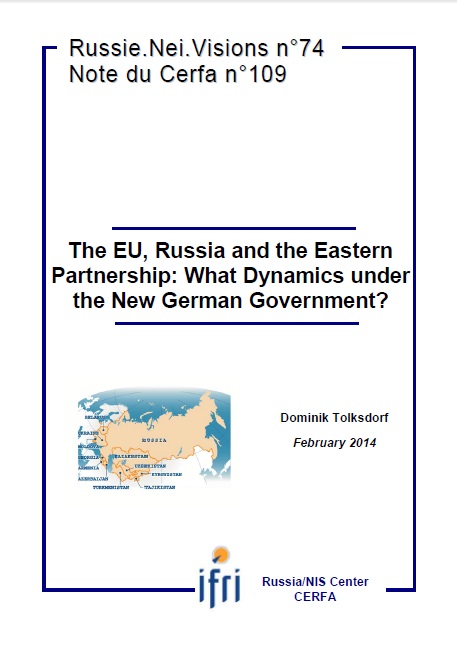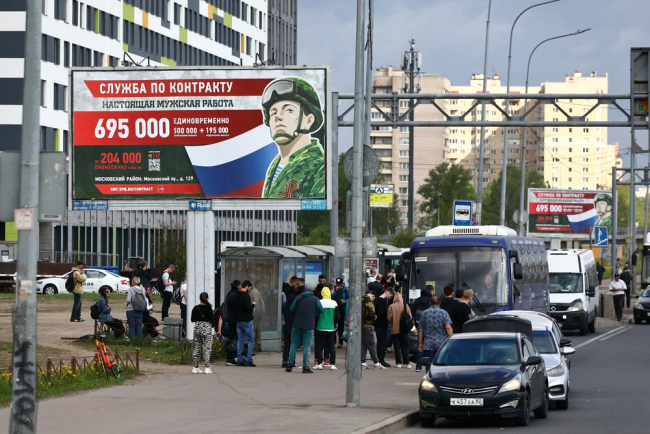The EU, Russia and the Eastern Partnership: What Dynamics under the New German Government?

The Eastern Partnership summit in Vilnius in November 2013 demonstrated that the European Union’s policy toward its eastern neighbors has developed into a highly contentious issue between the EU and Russia.
The summit was overshadowed by the decision of the Ukrainian government not to sign an Association Agreement with the EU and the following mass demonstrations in Kyiv. This paper analyses the EU’s relations with the EaP countries and illustrates that all of them are torn between intensified relations with the EU and joining the Russian dominated Customs Union. Although the EU is rather reluctant to start a power game with Russia in the “shared neighborhood”, the EaP has without doubt led to strained EU-Russia relations. As will be illustrated, it is difficult on the EU level to constitute a clearly unified position on Russia. Among the explanatory factors is Germany, which has in the past often not aligned its position on Russia with its EU partners. German-Russian political relations, however, underwent a change since 2012, as the Merkel government has become more critical about political developments in Russia. Although the new “grand coalition” with Frank-Walter Steinmeier as foreign minister will pursue a more conciliatory tone toward the Kremlin than in the past two years, the German government is nevertheless likely to more closely align its position on Russia with its EU partners, and will also not shy away from criticizing the Kremlin if the Russian government attempts to undermine the EaP.
Dominik Tolksdorf is Transatlantic Post-Doctoral Fellow for International Relations and Security (TAPIR) at the French Institute of International Relations (Ifri). He focuses in his research on the European Union’s external relations and particularly its pre-accession, neighborhood and crisis management policies.
This publication is available in:
French: UE, Russie et Partenariat oriental : quelles dynamiques sous le nouveau gouvernement allemand ? (pdf)
Russian: ЕС, Россия и Восточное партнёрство: новая динамика отношений при новом правительстве в Германии? (pdf)

Available in:
Regions and themes
ISBN / ISSN
Share
Download the full analysis
This page contains only a summary of our work. If you would like to have access to all the information from our research on the subject, you can download the full version in PDF format.
The EU, Russia and the Eastern Partnership: What Dynamics under the New German Government?
Related centers and programs
Discover our other research centers and programsFind out more
Discover all our analysesWar as Social Elevator: The Socioeconomic Impact of Russian Military Keynesianism
In order to finance its war effort, the Russian state has spent substantial sums of money and implemented a form of “military Keynesianism” that is transforming society at both the socioeconomic and cultural levels. This has partially rebalanced the wide disparities in wealth, levels of consumption, and social prestige in Russian society by granting significant financial and symbolic advantages to peripheral Russia, which has long been overlooked by the central government.
The Contradictory Impacts of Western Sanctions on Economic Relations between Russia and Sub-Saharan Africa
How does Russia maintain economic ties with Africa despite Western sanctions? An analysis of investments, trade, and the circumvention strategies deployed by Moscow.
The Caspian Sea as an Emerging Energy Hub : Potentials and Limitations
This report analyzes the prospects of the Caspian Sea region — and its key actors except for Russia and Iran — becoming an important energy hub serving the needs of the European Union (EU).
The European Union's Strategic Test in Georgia
The political crisis brewing in Georgia is of an existential nature for the country. What is at stake is Georgia's future as a democratic and sovereign European nation (EU).









